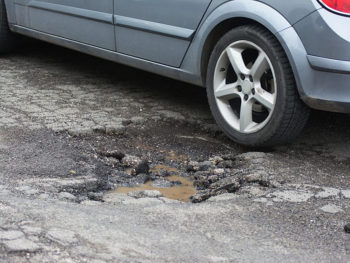Potholes repair bill hits £10bn
Eliminating the pothole backlog in England and Wales would cost £9.8bn and take a decade to complete despite increased local roads investment.

A one-time catch-up to bring our roads up to scratch would take 10 years to complete and cost £9.8bn
That’s the finding of this year’s Annual Local Authority Road Maintenance (ALARM) survey, which says that the extra money for local authority highway maintenance budgets is stemming the decline in the condition of the local road network, with a pothole being fixed on average every 17 seconds now; but the cost of getting roads up to scratch has risen 5.4% from £9.3bn last year.
Published today (26th March 2019) by the Asphalt Industry Alliance (AIA), the research for 2018/19 shows that average highway maintenance budgets were up almost 20% for the second year running, including a share of the £420m additional funding allocated in the November 2018 Budget.
But there is still a big discrepancy between the haves and have nots, according to AIA chairman Rick Green, who pointed out that some local authorities received the equivalent of more than £90,000 per mile of their individual networks, but several have less than £9,000 per mile to maintain their local roads.
Road user compensation claims also show a mixed picture, with the amount paid out in England falling by 9% from £6.7m last year to £6.2m this but the total cost of claims having risen 15.4% from £19.5m to £22.5m due to staff costs.
In response, the AIA renewed its call for increased funding.
“With the amount needed to bring the local road network up to scratch still approaching £10bn, sustained investment over a longer timeframe is needed if we want a local road network that supports enhanced mobility, connectivity and productivity,” said Green. “Last year the AIA set out that £1.5bn additional funding was needed for local roads each year for the next 10 years to allow them to be brought up to a condition from which they can be managed in a cost-effective way. We stand by this call.”
The Local Government Association echoed the call as it agreed that roads are deteriorating at a faster rate than can be repaired by councils, despite their efforts.
Cllr Martin Tett, the association’s transport spokesman, said: “Extra one-off funding announced in the Budget will help councils continue to try and improve roads this year but the Spending Review needs to provide councils with long-term and consistent funding to invest in the resurfacing projects which our road network desperately needs over the next decade.
“Reinvesting two pence per litre of existing fuel duty into local road maintenance would provide £1 billion a year for councils to spend on improving roads and filling potholes and begin bringing our roads up to scratch.”
The RAC also continued to urge for funds from fuel duty to be ring-fenced to help clear the backlog of potholes as it commented on the research. Head of roads policy Nicholas Lyes said: “The results from this year’s survey chimes with our own breakdown data, which suggests the overall state of the UK’s roads is not getting any worse. But this is hardly positive – it remains the case that a driver today is still more than twice as likely to breakdown as a result of a pothole than in 2006, and potholes not only cause expensive damage to vehicles but are also a very real road safety danger for drivers, bikers and cyclists alike. And, surely it shouldn’t be the case in 2019 that a driver can switch from a major A-road to a minor road and see an immediate degradation in surface quality.”
The research comes as new analysis by Kwik Fit find that the cost to UK motorists of repairing pothole damage has surpassed the £1bn mark. More than 11 million drivers have been affected by potholes in the last 12 months, costing £1.2bn – an increase of £296m on last year. In the year ending March 2016, the equivalent bill was £684m, meaning the cost of damage reported by motorists has risen by 77% in just three years.
The analysis also found more than half (51%) of people travelling on UK roads believe they are worse now compared to a year ago, with 60% saying they are in a poorer state when compared to five years ago.

















